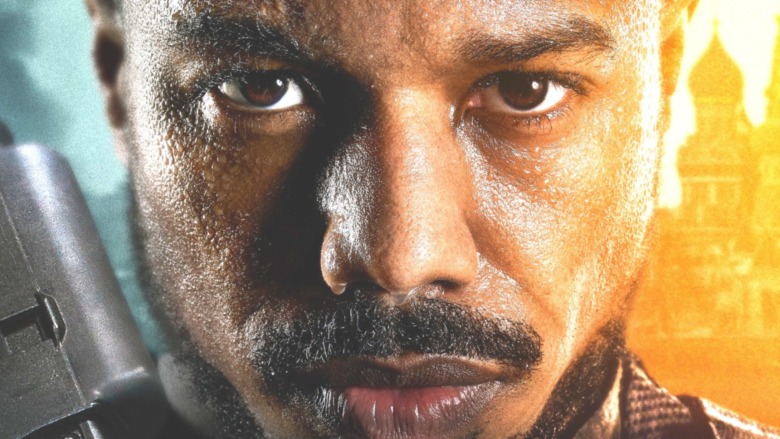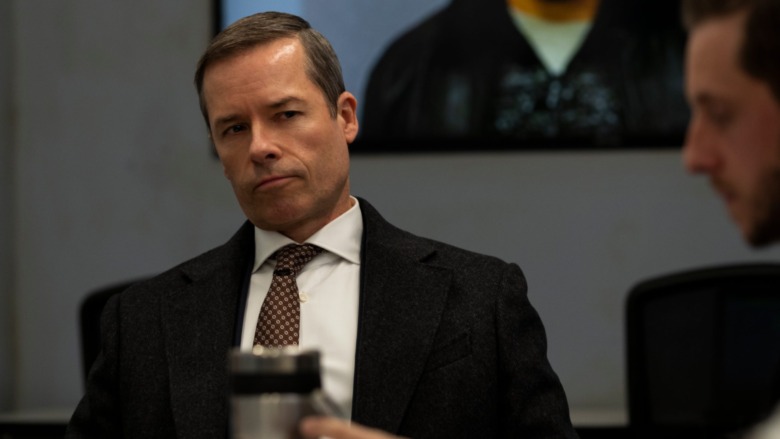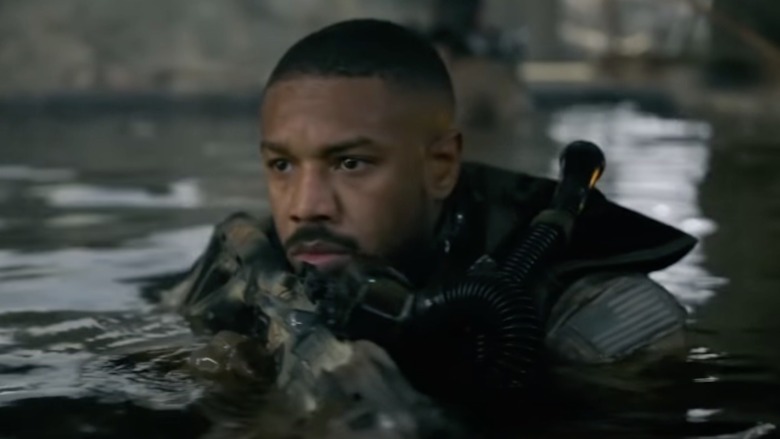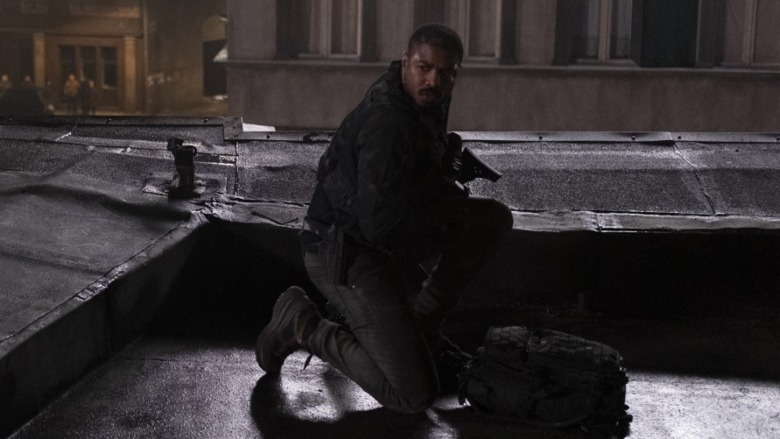The Ending Of Without Remorse Explained
Tom Clancy is one of the most prolific authors to ever live, thanks to his brand of military- and espionage-themed novels. Next to Stephen King, his works have likely been the most adapted in film and television history, with many properties going on to become cornerstones of the genre, including "The Hunt for Red October," "Patriot Games," and "The Sum of All Fears." That's not even getting into the "Jack Ryan" series currently on Amazon, as well as a slew of video games based on his work like "Splinter Cell" and "Rainbow Six."
Film writers and directors haven't run out of source material just yet as Clancy's 1993 novel, "Without Remorse," has just received the live-action treatment. The movie of the same name debuted on Amazon Prime, giving action movie fans the kind of high-octane adrenaline ride they've been looking for. It stars Michael B. Jordan as U.S. Navy SEAL John Kelly, who finds himself in an international plot after a group of mercenaries murder his pregnant wife.
In typical Clancy fashion, it all comes to a head in the finale where secrets are revealed and everyone's true allegiances come to light. Here's all you need to know about the "Without Remorse" ending without having to read the 639-page novel.
The endgame was always war
John Kelly was supposed to die in the attack, but he lives and ends up getting wrapped in a mission to figure out who came after him. Once he gets the team back together, they receive intelligence that all the information they need is in Murmansk, Russia. It's there John meets Rykov (Brett Gelman), believing he's the one in charge, but he outright says he's not the top dog. There always has to be some kind of twist in these movies, and it's not long before John discovers the truth that Secretary Thomas Clay (Guy Pearce) was actually the one pulling all the strings.
Once John threatens Clay's family, he comes clean about everything. He orchestrated everything from the dead Navy SEALS to the dead Russians in Murmansk to kickstart a new Cold War between the U.S. and Russia. The reason? Money. It always comes down to money.
You see, Clay reminisces fondly about how giving the American people an enemy for so many years was good for business. As he explains, "Our fear of [the Soviet Union] unified our people, gave us purpose. The problem today, John, is half this country thinks the other half is its enemy because they have no one else to fight." The book "Without Remorse" is based on came out in 1993, but it's been adapted to fit with modern themes. The United States is indeed more divided more than ever between political factions and religious ideals. By orchestrating his own war, Clay feels as though he could unite the country, not unlike what Ozymandias' plan was in "Watchmen." Of course, John kills Clay, and the world is safe from another Cold War... for now.
John's now a ghost
Prior to saving the world from another Cold War, John murdered a whole bunch of Russians in a very public fashion. It ended up working since he got the name "Rykov" out of it, so the CIA sends him on a top-secret black ops mission to prevent an all-out war from breaking out. After everything is wrapped up, it's not like John can go back to living in the suburbs, so he comes up with an arrangement where he's essentially a ghost to be used by the CIA when they need someone to complete a mission without making a lot of noise.
The CIA even held a fake funeral for John, meaning he's dead to the world. Ritter (Jamie Bell) sets him up with a nice chunk of money, and John's on his way until his country needs him again. John was ready to settle into a quieter life in "private security" at the beginning of his film, but that possibility was stripped away from him the moment his pregnant wife was killed. At that moment, he became so filled with vengeance and wouldn't stop until everyone responsible for his trauma was dealt with. Now that Clay is dead, there's nothing left for him to do, so it makes sense he would stay under the watchful eye of his colleagues at the CIA (off the books, of course). He's basically just an unstoppable weapon at this force, and John going underground sets up a prospective sequel nicely.
The mid-credits scene sets up another popular Tom Clancy story
Marvel movies helped popularize the mid-credits/post-credits scene in the modern era. It all started when Nick Fury (Samuel L. Jackson) paid Tony Stark (Robert Downey Jr.) a surprise visit and namedropped the "Avengers Initiative" that made everyone stay in their seats after the credits rolled. If you stay through the credits on "Without Remorse," then you'll come across a scene that plays almost identical to that "Iron Man" one.
In it, John meets up with Ritter, saying he's interested in creating "a multinational counter-terrorist team made up of US, UK, hand-selected NATO personnel with the full support of the national intelligence services." If that sounds like a mouthful, he follows it up by saying he wants to name the group "Rainbow," which he refers to as being "personal." The only thing we can think of that "Rainbow" would mean is that it was the name he and his wife had planned on naming their daughter. Regardless, anyone familiar with Tom Clancy's bibliography or who plays a lot of tactical shooter video games knows that's a reference to "Rainbow Six," so it's clearly setting up Michael B. Jordan to return for a follow-up — as long as "Without Remorse" is successful enough.
Adapting arguably Clancy's most famous work has been in the cards all along, as Variety reported in 2018 that Jordan was attached to star in at least two Clancy films — "Without Remorse" and "Rainbow Six." It'll be interesting to see how the studio adapts the story seeing as how the first "Rainbow Six" novel involves a pandemic where a biotech firm releases a vaccine that kills anyone who gets it. Not sure how well that would play in a post-coronavirus world...



